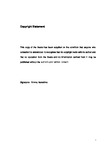FACILITATING MIDWIFERY INVOLVEMENT IN MANAGING GESTATIONAL WEIGHT GAIN IN PREGNANT WOMEN LIVING WITH OBESITY
| dc.contributor.supervisor | Rees, Gail | |
| dc.contributor.author | Hazeldine, Emma Louise | |
| dc.contributor.other | Faculty of Health | en_US |
| dc.date.accessioned | 2018-07-30T11:48:09Z | |
| dc.date.available | 2018-07-30T11:48:09Z | |
| dc.date.issued | 2018 | |
| dc.identifier | 10074451 | en_US |
| dc.identifier.uri | http://hdl.handle.net/10026.1/11961 | |
| dc.description.abstract |
Overview: Pregnant women living with obesity are at increased risk of pregnancy complications, with risks rising as Body Mass Index (BMI) increases. Midwives are willing to support women with managing their gestational weight gain but lack confidence and access to supporting resources. In the UK there are no interventions that aim to change the intention and behaviour of midwives, to support women with managing their gestational weight gain. The Theory of Planned Behaviour (TPB) (Ajzen, 1985) was utilised to frame the design of a behaviour change intervention for midwives. This three-phase study conducted a qualitative needs assessment, intervention design, and a quantitative study of, intervention testing. Methods: Phase One: Interview data were thematically analysed and the TPB utilised to elicit participants’ salient beliefs, to inform intervention design. Phase Two: The design of the intervention, and the TPB scale, were informed by Phase One data. Midwives reviewed the intervention and participated in a pilot test of the scale. Phase Three: The intervention was tested in a before-and-after controlled trial, utilising the refined TPB scale. Results: Phase One: 4 key themes emerged: 1)The current state of affairs 2) Perspectives on an intervention: what may work 3) Influences on uptake and successful weight control 4) Taking things forward. Phase Two: An intervention to facilitate the involvement of community midwives in supporting weight management for pregnant women living with obesity; a booklet about weight management in pregnancy; and a TPB scale were designed. Recommendations from midwives were integrated into the final intervention resource, and pilot testing of the scale led to refinement for use in phase 3. Phase Three: Midwives in the intervention group increased their intention to offer weight management support to pregnant women living with obesity. Furthermore, midwives in the intervention group increased actual weight management support for pregnant women living with obesity, after participating in the intervention. Conclusions: This study made a unique contribution to new knowledge by developing and testing a novel intervention that was underpinned by health psychology theory, which increased the intention and behaviour of community midwives to support pregnant women living with obesity, with managing their gestational weight gain. | en_US |
| dc.language.iso | en | |
| dc.publisher | University of Plymouth | |
| dc.rights | Attribution-NonCommercial-NoDerivs 3.0 United States | * |
| dc.rights.uri | http://creativecommons.org/licenses/by-nc-nd/3.0/us/ | * |
| dc.subject | Behaviour change intervention for midwives | en_US |
| dc.subject | Three-phase study | en_US |
| dc.subject | Health psychology theory | en_US |
| dc.subject | Pregnant women living with obesity | en_US |
| dc.subject | Theory of planned behaviour | en_US |
| dc.subject.classification | PhD | en_US |
| dc.title | FACILITATING MIDWIFERY INVOLVEMENT IN MANAGING GESTATIONAL WEIGHT GAIN IN PREGNANT WOMEN LIVING WITH OBESITY | en_US |
| dc.type | Thesis | |
| plymouth.version | publishable | en_US |
| dc.identifier.doi | http://dx.doi.org/10.24382/1195 | |
| dc.rights.embargoperiod | No embargo | en_US |
| dc.type.qualification | Doctorate | en_US |
| rioxxterms.version | NA |
Files in this item
This item appears in the following Collection(s)
-
01 Research Theses Main Collection
Research Theses Main



